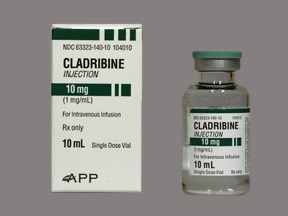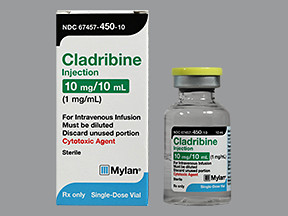CLADRIBINE - INJECTION
PHONETIC PRONUNCIATION: (KLAD-rib-een)
COMMON BRAND NAME(S): Leustatin
GENERIC NAME(S): cladribine
Uses
USES: Cladribine is used to treat a certain type of cancer (hairy cell leukemia). It works by stopping the growth of cancer cells.
How to use CLADRIBINE - INJECTION
HOW TO USE: This medication is given by injection into a vein by a health care professional. Dosage is based on your weight and response to treatment. This medication is usually given continuously for 7 days in a row or as directed by your doctor. Avoid getting the medication on the skin or in the eyes, mouth, or nose. If you do get the medication in those areas, flush with plenty of water and tell your doctor right away.
Side Effects
Precautions
Interactions
Overdose
Images
Reviews
Faq for CLADRIBINE - INJECTION
Cladribine injection is used to treat hairy cell leukemia, a rare type of cancer that affects the white blood cells.
Clanidine injection works by interfering with the growth and reproduction of cancer cells, thereby slowing down the progression of hairy cell leukemia.
Cladribine injection is given by a healthcare professional through a vein (intravenously) over a span of 2 hours, usually once every week or every 4 weeks, depending on the treatment plan.
The common side effects of cladrine injection include nausea, vomiting, diarrhea, fever, tiredness, weakness, and low blood cell counts. Consult your doctor if you experience any severe or persistent side effects.
The effects of cladrine injection may take several weeks or months to become fully noticeable. It is important to continue the treatment as prescribed by your healthcare provider.
Yes, cladrine injection can interact with certain medications, including vaccines, live vaccines, and certain antiviral drugs. Inform your doctor about all the medications you are currently taking to avoid any potential interactions.
Cladrine injection may harm an unborn baby, and its safety during breastfeeding is not known. It is important to discuss the risks and benefits with your doctor before using this medication if you are pregnant or breastfeeding.
The duration of treatment with cladrine injection will depend on your response to the medication and the recommendation of your healthcare provider. It is important to follow your doctor's instructions and complete the full course of treatment.
It is recommended to avoid alcohol consumption while receiving cladrine injection, as it may increase the risk of side effects and drug interactions.
Warning
WARNING: This medication may cause very serious blood disorders (decreased bone marrow function leading to low number of blood cells such as white cells, red cells, and platelets). This effect can weaken the immune system/increase the risk of infection, cause anemia, or cause your body to bruise or bleed easier. Tell your doctor right away if you develop any of the following: signs of infection (fever, persistent sore throat), easy bruising/bleeding, unusual tiredness, fast/pounding heartbeat. When used in high doses, cladribine may cause very serious kidney or nerve problems. Nerve problems may also rarely occur in patients taking the normal dose of cladribine. Get medical help right away if you develop any of the following: change in the amount of urine, weakness/numbness/tingling in your hands/feet, or inability to move your arms/legs. Cladribine may increase your risk of getting a rare but very serious (possibly fatal) brain infection (progressive multifocal leukoencephalopathy-PML). Get medical help right away if you have any of these side effects: clumsiness, loss of coordination/balance, weakness, sudden change in your thinking (such as confusion, difficulty concentrating, memory loss), difficulty talking, seizures, or sudden vision changes. See also Side Effects section.
Disclaimer
IMPORTANT: HOW TO USE THIS INFORMATION: This is a summary and does NOT have all possible information about this product. This information does not assure that this product is safe, effective, or appropriate for you. This information is not individual medical advice and does not substitute for the advice of your health care professional. Always ask your health care professional for complete information about this product and your specific health needs.


No Reviews Yet